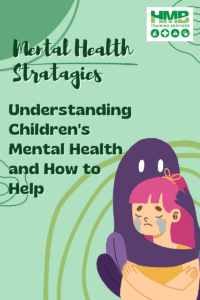Mental Health: the importance in Children and not just Adults
Children’s mental health can be pushed away or dismissed, however knowing what are the top 5 strategies for improving a child’s mental health can massively help any child.
What is mental health in Children?
Mental health is a crucial aspect of overall well-being, and this is especially true for children. Good mental health helps children to develop and grow, form positive relationships, and cope with life’s challenges. Unfortunately, many children experience mental health problems, and it’s important to understand the importance of supporting young people to maintain good mental health.

According to studies, 1 in 6 persons each week deal with a common mental health issue. 17.4% of children aged 6 to 16 had a likely mental health condition in the previous year.
Our emotional, psychological, and social well-being are all parts of our mental health. It impacts the way we feel, think, and behave. It also influences how we respond to stress, interact with others, and make decisions. Every period of life, from childhood and adolescence to maturity, is vital for mental health. Everyone, though, has mental health.
Mental health problems in children can manifest in many different ways and can range from mild to severe. Some common symptoms of mental health problems in children include anxiety, depression, behavioural problems, and difficulty with social interactions. If left untreated, mental health problems can have a significant impact on a child’s life, affecting their ability to learn, make friends, and enjoy life to the fullest.
By promoting good mental health in children, we can help them build resilience and develop the skills they need to lead fulfilling and healthy lives. This can involve providing children with a supportive and nurturing environment, encouraging healthy habits, and promoting positive relationships. Additionally, early identification and intervention is crucial in helping children overcome mental health problems and reach their full potential.
Why do Children Have Poor Mental Health?
Mental health in children can be impacted by a number of factors, including genetics, environment, and life experiences. Some children may be predisposed to certain mental health conditions due to their family history, while others may develop mental health problems as a result of exposure to stressful or traumatic events.
It’s important to remember that mental health problems are not the child’s fault and are not a reflection of poor parenting or weak character. With the right support and intervention, however, most children can overcome mental health problems and go on to lead healthy and productive lives.
Signs and Symptoms of Children’s Mental Health
The signs and symptoms of mental health problems in children can vary depending on the child’s age, the type of mental health problem, and individual differences. However, here are some common signs and symptoms to look out for:
- Changes in mood or behaviour: This may include irritability, sadness, anxiety, anger, or aggression.
- Difficulty with social interactions: Children with mental health problems may struggle to make friends, communicate effectively with others, or participate in group activities.

- Changes in sleep patterns: This may include difficulty falling asleep, waking up frequently during the night, or excessive sleepiness during the day.
- Changes in appetite: Children with mental health problems may eat significantly more or less than usual, or refuse to eat certain foods.
- Difficulty concentrating or paying attention: Children with mental health problems may have trouble staying focused in class or completing tasks at home.
- Withdrawal from friends and family: Children with mental health problems may start to isolate themselves, avoiding social interactions and spending more time alone.
- Physical complaints: Children with mental health problems may experience headaches, stomach aches, or other physical symptoms that don’t have a clear physical cause.
- Decreased interest in favourite activities: Children with mental health problems may lose interest in activities that they previously enjoyed.
It’s important to remember that these signs and symptoms can also be related to other health problems, so it’s best to consult a doctor or mental health professional for a proper evaluation and diagnosis. Early identification and intervention can greatly improve a child’s chances of a positive outcome, so it’s important to seek help if you have concerns about a child’s mental health.
How Can you help Promote Children’s Mental Health?
Some common interventions for mental health problems in children include therapy, counselling, medication, and support from family, friends, and community organisations. Therapy can help children develop coping skills, build resilience, and learn to manage their emotions, while medication can help alleviate symptoms of certain mental health conditions. Family and community support can also play a crucial role in promoting good mental health, as children who feel supported and valued are more likely to thrive.
Overall, mental health is a complex and multifaceted issue, and it’s important to approach it with compassion and understanding. By promoting mental health and well-being in children, we can help them develop the skills and resilience they need to lead happy and fulfilling lives.
What are the top 5 strategies for improving a child’s mental health
Here are five strategies that can help improve a child’s mental health:
- Promote a healthy and supportive environment: This includes creating a safe and secure home environment, fostering strong family relationships, and promoting a positive school experience.
- Encourage healthy habits and self-care: This includes promoting physical activity, healthy eating, good sleep habits, and stress management techniques.
- Foster positive relationships: Encourage children to form strong relationships with their peers, family, and community, and teach them positive communication skills.
- Provide opportunities for children to express themselves: Encourage children to express their emotions, thoughts, and feelings through various forms of self-expression, such as writing, art, or music.
- Access to mental health support: Encourage children to seek help when they need it and ensure that they have access to mental health support, such as therapy or counselling, if necessary. This may involve working with schools, health professionals, or community organizations to provide children with the resources and support they need.
It’s important to remember that every child is unique and may need different strategies to promote their mental health. Additionally, it’s important to continue monitoring a child’s mental well-being and making adjustments as needed.
How to support a child with Poor Mental Health
Here are some steps you can take to support a child with poor mental health. These will help to understand “what are the top 5 strategies for improving a child’s mental health”;
- Listen and validate their feelings: Let the child know that you are there to listen and that their feelings are valid. Provide a non-judgmental space for them to express their thoughts and emotions.
- Encourage professional help: If you have concerns about the child’s mental health, encourage them to seek professional help. This can be through a paediatrician, school counsellor, or a mental health professional.
- Promote self-care: Encourage the child to engage in self-care activities, such as exercise, healthy eating, and getting enough sleep. Teach them coping skills, such as deep breathing, mindfulness, and visualization, to help manage stress and anxiety.
- Encourage positive relationships: Positive relationships with family, friends, and peers can have a powerful impact on a child’s mental health. Encourage the child to develop and maintain healthy relationships, and provide opportunities for them to interact with others in positive and supportive ways.
- Be patient and persistent: Supporting a child with mental health problems is a process, and it’s important to be patient and persistent. With the right resources and support, most children can overcome mental health problems and go on to lead healthy and fulfilling lives.
- Seek support for yourself: Supporting a child with mental health problems can be challenging. It’s important to take care of yourself and seek support from friends, family, or a mental health professional if you need it.
Remember, every child is unique, and what works for one child may not work for another. Be open to trying different strategies and be willing to adapt your approach as needed. The most important thing is to provide love, support, and a safe environment for the child to heal and grow.
Final Thoughts
Here are a few other factors to think about in relation to children’s mental health:
- Early intervention: Early intervention is key to preventing and treating mental health problems in children. If you suspect that a child may be experiencing mental health problems, seek help as soon as possible.
- Stigma: Stigma surrounding mental health can prevent children and families from seeking help. Encourage children to seek help, and work to reduce stigma by educating others and promoting a positive understanding of mental health.
- Family involvement: Family involvement is critical to a child’s mental well-being. Parents, guardians, and other family members can provide support, stability, and a positive role model for children.
- School involvement: Schools play an important role in supporting children’s mental health. Encourage schools to provide resources, support, and education about mental health, and work with teachers and school staff to identify and support children who may be struggling.
- Multidisciplinary approach: Mental health problems often involve multiple factors, and a multidisciplinary approach can be effective in addressing these issues. This may include a combination of therapy, medication, and other interventions, as well as support from family, friends, and community resources.
- Importance of play: Play is a critical component of children’s development, and it can also play a role in promoting mental health. Encourage children to engage in play, both alone and with others, and provide opportunities for creative and imaginative play.
- Technology: Technology can both positively and negatively impact children’s mental health. Encourage children to use technology in moderation, and monitor their use of technology to ensure it’s not causing undue stress or anxiety.
- Regular check-ins: Regular check-ins with children about their mental health can help identify problems early and provide opportunities for support and intervention. Make time to talk with children, ask them how they’re feeling, and provide a safe and supportive environment for them to express their thoughts and emotions.
Please visit HERE to read more on Children’s Mental Health. NHS and Mind websites can offer more advice. If you are struggling with a child’s mental health please speak to your Doctor
HMB Training – Mental Health First Aid Courses
Our mental health first aid courses are ran by a team of trainers; Heather and Mathew where they include stories of others and their own experiences. Bringing real life scenarios to the classroom not only enhances learning but understand what people may go through in their day-to-day lives. HMB Training Services are passionate in saving lives and spreading the awareness of Mental Health within our mental health first aid courses. In England, 1 in 6 people report experiencing a common mental health problem (such as anxiety and depression) in any given week.
What is included in out Mental Health Courses
Our courses are structured into modules, discussions and videos. Our three levelled courses (level1 , level 2 and level 3) start with introduction into mental health first aid including the relevance into first aid elements. Understanding the impact of mental health problems from; day-to-day, physical health, work and education. You will understand the effects of stigma associated with mental illness and know how to cope. Knowing mental health on a continuum with being diagnosed and un-diagnosed. Understanding the risk factors, just like our cake analogy, and when early warning signs of mental health is becoming a problem. On our level one course you will understand how to start a difficult conversation. On our level two and three course you will have the opportunity to make these conversations through our role play activity. Know when and how to make a call especially if you believe the person is in a state of crisis.
All of our levelled courses include: Stress, Depression, Anxiety, Psychosis, Eating Disorders, Self-harm and Suicide.
Level two course includes Drugs and Alcohol, Self-medicating, additional signposting, and first aid plan – role play activity, Mental Health in the Workplace and the Five Steps to Mental Well-Being.
Level three course includes all of level two as above and: Personality Disorders, Bipolar Disorder, Schizophrenia, Post-Traumatic Stress Disorder and more in depth in each condition on how to sign post and get further help.
Why become trained in Mental Health First Aid?
Attending a mental health course will help you to realise just how widespread the problem can be for individuals who are affected by poor mental health, as well as create a new perspective on all of the ways it can affect their lives. Knowing more about poor mental will not only reduce stigma but get people talking without judgement. Talking more reduces the signs and symptoms but reduces the chances of mental health becoming a diagnosable mental health illness.
We have courses online delivered via zoom, or in our classroom at Brownhills. If you have a group of staff need training to become Mental Health First Aiders we can come to your classroom on site.
To view our open courses please click here; Mental Health First Aid
Contact us
Call us on 01543 453338 or email at info@hmbtrainingservices.co.uk



